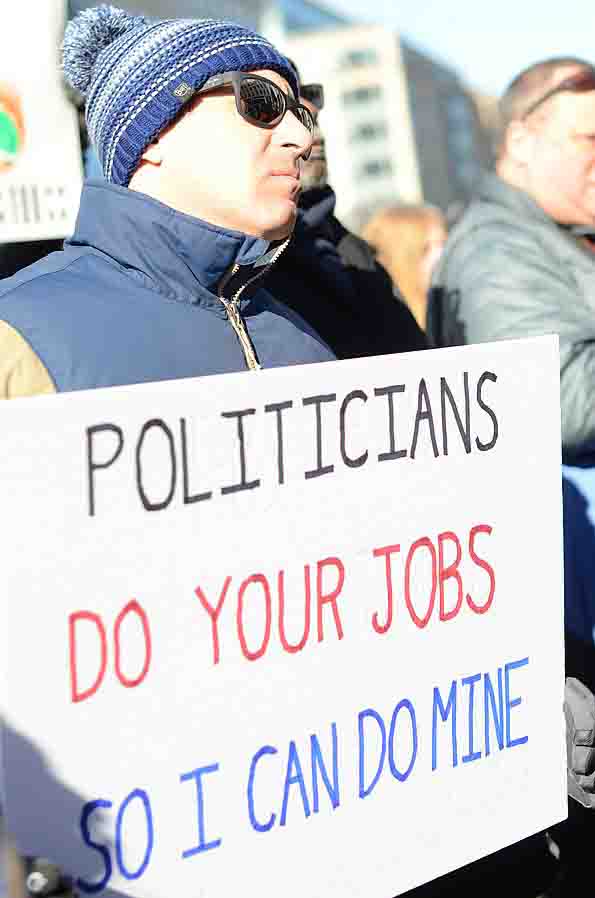
Wikimedia Commons
Unreceived paychecks. Long lines at airports. Unprocessed farmers’ loans that threaten next year’s harvest.
Across Connecticut, both workers and consumers are reeling from the effects of the longest-ever partial federal government shutdown as it enters its 25th day.
The shutdown went into effect on Dec. 22 after President Donald Trump and congressional Democrats failed to reach an agreement on the 2019 budget. Trump has demanded that the budget include $5.7 billion in funding for a wall on the Mexican-American border, but Democrats have refused grants that demand thus far. As a result of the shutdown, over 800,000 federal employees have either been furloughed or are required to continue working without pay. Affected employees will receive payments only once a budget passes.
“The government is meant to share authority and responsibility, and now just one branch is responsible for a breakdown in government operations,” said mayoral spokesman Laurence Grotheer. “This shutdown could cause an erosion of fundamental aspects of government.”
According to the U.S. Department of Labor, there were 2,819,960 federal employees as of June 2017, of whom around 17,996 work in Connecticut. Roughly 5,000 are active duty military, and about 3,500 work for the Department of Veterans Affairs. Fewer than 0.4 percent of the Connecticut workforce is affected by the shutdown, according to the Office of Personnel Management.
Connecticut ranks among the most expensive states in terms of cost of living, making the pain of the delay in payment even more acute. In New Haven County, for example, a family of four must earn more than $92,000 annually to live comfortably, according to the Economic Policy Institute.
Sen. Chris Murphy, D-Conn., and Mayor Toni Harp held a rally with Transportation Security Administration agents at Tweed-New Haven Regional Airport on Jan. 11 to call for an end to the shutdown.
“This ongoing federal shutdown underscores how the federal government is being held hostage by extremism emanating from the Oval Office,” said Harp at the event.
The mayor added that the effects of the shutdown hit close to home, as TSA agents at Tweed and members of the Coast Guard stationed in New Haven continue to work after missing their first paycheck over the weekend.
According to Grotheer, the Elm City might also face reductions in funding for the city government and the public school district if federal funding does not come through.
Local federal employees working without pay also used the opportunity to express their anger at the shutdown.
“Put us back to work. We’re dedicated employees who show up to work every day and make it safe to travel,” said electronics systems technician Dennis Amato during the event at Tweed. “They should perhaps make it illegal to shut the government down in the future.”
However, not all attendees agreed with the rhetoric Harp and Murphy used. Larissa Martinez ’20, who happened to come across the event after her flight landed, felt that Democratic politicians tried to use the effects of the shutdown to attack their enemies rather than to address underlying societal issues.
“The way the event was framed really bothered me,” Martinez told the News, citing how Murphy emphasized that federal employees were living paycheck to paycheck in order to attack Trump. “There was no talk of structural changes … It seemed to focus on party affiliation and party politics, which isn’t really productive.”
The shutdown also looms large over the start of Gov. Ned Lamont’s first term, which began on Jan. 9.
Lamont centered much of his campaign around Connecticut’s economic woes and around his ability to create a balanced budget.
“Unlike in D.C., our government doesn’t shut down — we don’t play those games here,” Lamont said in his State of the State address on Jan. 9. “We can’t tell students school is closed today, police or fire departments can’t say we’ll respond later and we don’t tell our most vulnerable that the services they depend upon will reopen at a later date.”
Connecticut faced its own fiscal crisis in 2017, when a budget impasse in the state Senate split evenly between Democrats and Republicans lasted for several months and became the longest in state history.
Nathalie Bussemaker | nathalie.bussemaker@yale.edu







